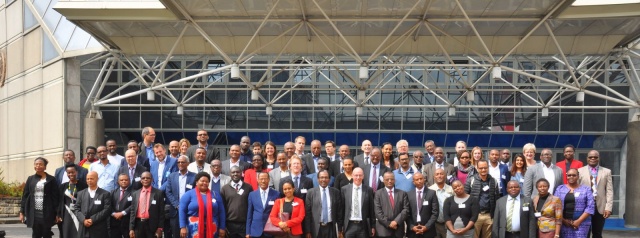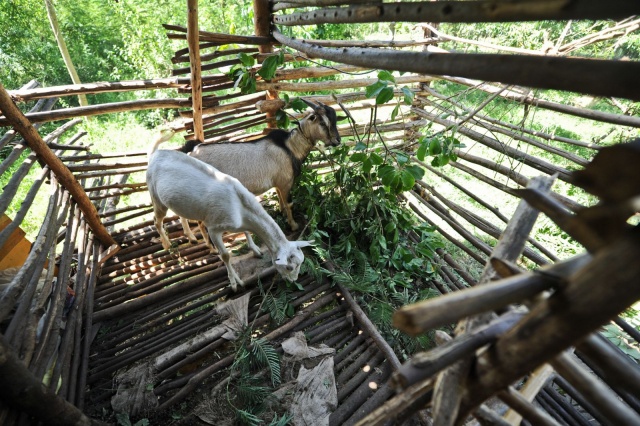Three countries in Eastern Africa join the Global Research Alliance on Agricultural Greenhouse Gases
- From
-
Published on
21.02.19
- Impact Area

Climate change is transforming the planet’s ecosystems and threatening the wellbeing of current and future generations. To keep the increase in global temperature below 2°C and avoid dangerous climate change, reductions in global greenhouse gas (GHG) emissions are urgently required.
Globally, the livestock sector contributes a significant share to anthropogenic GHG emissions, but the sector also has the capacity to deliver a significant share of the necessary mitigation effort. As such, low emissions livestock development offers countries an opportunity to achieve economic gains and respond to climate change simultaneously.
Three Eastern African countries join the Global Research Alliance on Agricultural Greenhouse Gases
African countries are taking ambitious actions towards reducing GHG emissions from agriculture. Ethiopia, Malawi and Uganda are now among the 56 countries and the first three in Eastern Africa who have joined the Global Research Alliance on Agricultural Greenhouse Gases (GRA). This development originates from discussions initiated during the regional awareness raising workshop: ‘Low emissions livestock: Supporting policy-making and implementation through science in East Africa’. The workshop was held at the United Nations Economic Commission for Africa (UNECA) in Addis Ababa, Ethiopia, July 2-4, 2018.

Participants of the regional awareness raising workshop in Addis Ababa. Photo: T. Muchaba (CCAFS)
The workshop focused on livestock production and the reduction of GHG emissions. It was organized jointly by the CGIAR Research Program on Climate Change, Agriculture and Food Security in Eastern Africa (CCAFS-EA), the GRA, the Food and Agriculture Organization of the United Nations (FAO), the World Bank (WB), and the African Climate Policy Centre (ACPC) in collaboration with the governments of Ethiopia and New Zealand.
Transforming livestock stereotypes
Globally, especially in Africa, livestock plays an important role in supporting livelihoods, human health, nutrition and incomes. However, livestock is a major source of agricultural-related GHG emissions and the recent negative perception of the environmental impact of livestock production undermines its development potential.

Goats in Lower Nyando, Kenya, where agricultural interventions are being tested to address climate-related risks. Photo: K. Trautmann (CGIAR)
The GRA, CCAFS as well as national and international partners have been working together to provide practical and science-based support to countries pursuing green growth through livestock. The group is also seeking opportunities to enhance cooperation and investment in research to help reduce GHG emissions from agricultural production. Additionally, the GRA aspires to increase the potential of soil carbon sequestration as well as to improve efficiency, productivity, resilience and adaptive capacity of agricultural production systems.
Members of the GRA aim to deepen and broaden mitigation research efforts across the agricultural sub-sectors of paddy rice, cropping and livestock. Alongside, they coordinate cross-cutting activities across these areas.
Ethiopia, Malawi and Uganda are looking forward to working with other member countries to develop more efficient and sustainable agricultural systems to meet growing global demand for food in the context of a changing climate.
Read more:
News update: Using science to inform low emissions livestock policy development and implementation in East Africa
Related news
-

Justice in Transition: CGIAR Climate Security Launches Climate Justice Research at INAET 2025
The Alliance of Bioversity International and the International Center for Tropical Agriculture (CIAT)15.04.25-
Climate adaptation & mitigation
From energy geopolitics to climate equity, this year’s International Network on African Energy Tra…
Read more -
-

ASEAN-CGIAR Program charts future course, emphasizing scalability and sustainability
CGIAR15.04.25-
Adaptation
-
Climate adaptation & mitigation
-
Environmental health & biodiversity
-
Food security
-
Mitigation
-
Nutrition
-
Nutrition, health & food security
Bangkok, Thailand - The ASEAN-CGIAR Innovate for Food and Nutrition Security Regional Program recent…
Read more -
-

Building Capacity in Crop Modeling to Advance Circular Food Systems in Southern Africa
International Crops Research Institute for the Semi-Arid Tropics (ICRISAT)10.04.25-
Big data
-
Climate adaptation & mitigation
Training Equips Researchers to Support Smallholder Farmers with Climate-Smart, Sustainable Agricultu…
Read more -
